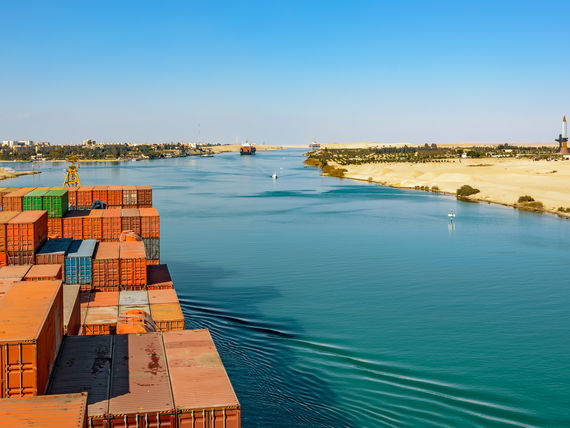BDP Trendwatch: Avalanche of containers bound for European ports sparks congestion fears, Suez canal shutdown highlights vulnerability of maritime chokepoints, Shanghai set to develop Hongqiao Airport - but not as a rival for Pudong

Avalanche of containers bound for European ports sparks congestion fears
Ketchupeffekt is the Swedish term used by the port of Gothenburg to describe the avalanche of containers set to flood European ports in the coming weeks.
Ketchup effect – as many can imagine – describes a situation or event where not much happens for a long time, and then a lot happens at once. The significance of ketchup will be clear to anyone who has ever tried to pour the sauce from a glass bottle — usually it takes several seconds before any comes out, and then you get a huge amount.
Source: Splash 24/7
Suez Canal shutdown highlights vulnerability of maritime chokepoints
First came the pandemic of 2020, roiling shipping and disrupting the supply chains in and out of China before spreading out to the rest of the world. Then came one of the biggest hurdles the logistics industry has faced in years – a six-day closure of the Suez Canal, caused by the grounding of the 20,000 TEU container ship Ever Given.
An estimated 12 percent of the world's trade passes through the Suez Canal daily, representing almost $10 billion in value, according to Llyod's List. Serving as the link between Asian manufacturing powerhouses and wealthy markets in Europe, it is among the most important waterways in the world.
Source: The Maritime Executive
Shanghai set to develop Hongqiao Airport - but not as a rival for Pudong
Shanghai plans to develop its domestic airport into a major international hub - but insists it won’t “fall into vicious competition” with Shanghai Pudong International (PVG), the country’s biggest air cargo gateway.
This month, the Shanghai municipal government published a blueprint to develop Hongqiao International Airport (SHA), a 7,000 sq km site on the city’s western outskirts, connecting with neighbouring Jiangsu province.
Source: The Loadstar
Who is king of cargo-only passenger flights?
When COVID decimated passenger travel last year, airlines pivoted to air cargo like never before, turning many idle aircraft into temporary freighters. It was an innovation born of necessity that helped bring in much-needed cash.
Shippers were desperate when nearly all widebody aircraft were eliminated from service a year ago, because they carry more than 50% of total air cargo in the hold below people’s feet. Big freighters couldn’t make up the difference and airfreight rates skyrocketed. High yields convinced airlines to repurpose aircraft for cargo customers, even though passenger aircraft hold fewer goods by volume than pure freighters that can load heavy containers on the main deck.
Source: FreightWaves, American Shipper
Irish Ferries aims to make a splash in the Dover-Calais market
Shippers and hauliers using Dover-Calais ferry services will enjoy an expanded range of options after Irish Ferries announced it would begin operating a service in June.
The company, which operates Great Britain-Ireland and France-Ireland Irish Sea services, said it would move into the new market with the transfer of its Isle of Inishmore vessel, currently deployed on its Rosslare-Pembroke service.
Source: The Loadstar
One in four small UK exporters halt EU sales
New research this month by the UK’s Federation of Small Businesses (FSB) shows that UK-EU export problems have persisted into March and are “in danger of becoming permanent”.
Almost one quarter of small UK exporters have temporarily halted sales to European Union (EU) customers and a further 4% have already decided to stop selling into the bloc permanently, while more than one in ten (11%) exporters are considering halting sales to Europe permanently, the new survey has found.
Source: Lloyd´s Loading List
Bangladesh frees up boxes and yard space – but it still may not help exports
Bangladesh is freeing-up of hundreds of containers that have remained undelivered for years and occupy valuable space at Chittagong port and depots.
Chittagong Customs and the Chittagong Port Authority started work this morning to make the containers available and free yard space, amid worldwide shortages of equipment.
Source: The Loadstar


